-
ORIGINAL ARTICLE12-16-2024
Respectful care for postpartum women with sickle cell disease: a netnographic study
Revista Brasileira de Enfermagem. 2024;77(6):e20230545
Abstract
ORIGINAL ARTICLERespectful care for postpartum women with sickle cell disease: a netnographic study
Revista Brasileira de Enfermagem. 2024;77(6):e20230545
DOI 10.1590/0034-7167-2023-0545
Views1See moreABSTRACT
Objectives:
to analyze principles of respectful maternity care in narratives of postpartum women with sickle cell disease, relating them to Sustainable Development Goals.
Methods:
netnographic study, with two videos published in 2020. Deductive iconographic and thematic analysis by Respectful Maternity Care Charter, organized in MAXQDA.
Results:
principles identified were the right to: freedom from harm and ill-treatment; information, informed consent, refusal of medical procedures, and respect for their choices and preferences including companion; be considered a person from birth, with dignified and respectful treatment; health at the highest possible level; newborns being with their parents or guardians. The Sustainable Development Goals for women by 2030 were not positively contemplated in postpartum women’s experience.
Final Considerations:
it is appropriate that health workers qualify themselves to provide respectful maternity care, with qualified listening, understanding, and resolution of unique demands of postpartum women with sickle cell disease, seeking equality in care for women.

-
12-16-2024
GerenciaDOR™: development of digital technology by nurses for the assessment of patients with chronic pain
Revista Brasileira de Enfermagem. 2024;77(6):e20240050
Abstract
GerenciaDOR™: development of digital technology by nurses for the assessment of patients with chronic pain
Revista Brasileira de Enfermagem. 2024;77(6):e20240050
DOI 10.1590/0034-7167-2024-0050
Views0See moreABSTRACT
Objectives:
to develop a digital technological solution (prototype) for assessing patients with chronic pain.
Methods:
this is a methodological and technological development study based on the Human-Centered Design framework and the principles of Patient-Centered Care. The prototype guides patients through a body diagram and directs them to an evaluation using specific instruments that address the multidimensional aspects of chronic pain.
Results:
the GerenciaDOR* project enables navigation through the Web App screens, providing access to pain assessment features up to the presentation of results.
Final Considerations:
the study describes a systematic approach to pain assessment and expands nurses’ knowledge in pain management. Additionally, it can promote the development of other digital technologies for chronic pain assessment and contribute to a multidisciplinary, patient centered treatment.

-
ORIGINAL ARTICLE12-16-2024
Psychometric analysis of ProQOL-BR in nursing: building hospital safety and protection
Revista Brasileira de Enfermagem. 2024;77(6):e20240085
Abstract
ORIGINAL ARTICLEPsychometric analysis of ProQOL-BR in nursing: building hospital safety and protection
Revista Brasileira de Enfermagem. 2024;77(6):e20240085
DOI 10.1590/0034-7167-2024-0085
Views0See moreABSTRACT
Objectives:
to analyze the psychometric properties of the ProQOL-BR instrument in hospital nursing professionals.
Methods:
a methodological study to validate the ProQOL-BR. Confirmatory factor analysis, assessment of local and global adjustment quality, Pearson hypothesis testing and Cronbach’s alpha internal consistency analysis were used.
Results:
a total of 490 professionals participated. The model presents adequate quality due to factor weights (λ≥ 0.40), acceptable overall fit quality and adequate chi-square ratio and degrees of freedom (χ2/g.1=2.51) for the parameters of CFI (0.923), GFI (0.902), TLI (0.914) and RMSEA (0.042). In terms of validity, it was shown to be adequate with CC=0.89. The internal consistency obtained by standardized Cronbach’s alpha was 0.761. Criterion validity was shown to be favorable with significant correlations (0.001).
Conclusions:
the instrument was validated regarding content, criteria and reliability. Three questions were removed from the original instrument, ProQOL-BR, leaving the final instrument with 25 questions.

-
REVIEW12-16-2024
Recommendations for guidelines for promoting mental health in the workplace: an umbrella review
Revista Brasileira de Enfermagem. 2024;77(6):e20240086
Abstract
REVIEWRecommendations for guidelines for promoting mental health in the workplace: an umbrella review
Revista Brasileira de Enfermagem. 2024;77(6):e20240086
DOI 10.1590/0034-7167-2024-0086
Views1See moreABSTRACT
Objectives:
to summarize the recommendations of guidelines for promoting mental health in the workplace.
Methods:
an umbrella review, according to Joanna Briggs Institute and Preferred Reporting Items for Systematic reviews and Meta-Analyses methodological assumptions. Data collection was carried out in January 2021 and updated in July 2023 in the American Psychological Association, Cochrane Library, EMBASE, National Library of Medicine, and Scopus databases. Systematic reviews that assessed guidelines with recommendations for mental health care for workers were included. PROSPERO registration CRD42023461845.
Results:
four systematic reviews published between 2015 and 2018 were identified. The abstracts highlighted actions that facilitate and inhibit the recommendations as well as three categories of intervention: primary prevention – worker protection; secondary prevention – promoting workers’ mental health; and tertiary prevention – supporting, monitoring and rehabilitating workers upon returning to work.
Conclusions:
the interventions are based on prevention, promotion and early recognition, support and rehabilitation of mental health problems.

-
ORIGINAL ARTICLE12-16-2024
Analysis of omission of antimicrobial doses in Intensive Care Units
Revista Brasileira de Enfermagem. 2024;77(6):e20240102
Abstract
ORIGINAL ARTICLEAnalysis of omission of antimicrobial doses in Intensive Care Units
Revista Brasileira de Enfermagem. 2024;77(6):e20240102
DOI 10.1590/0034-7167-2024-0102
Views0See moreABSTRACT
Objectives:
to analyze the rate of antimicrobial dose omission in intensive care units.
Methods:
cross-sectional study carried out between March 1 and September 30, 2023, in intensive care units of a University Hospital in Rio de Janeiro.
Results:
the sample consisted of 452 prescriptions and 1467 antimicrobial doses. The dose omission rate was 4.29%. Each antimicrobial prescribed increased the chance of omission by 51%. The strategy of double-checking prescriptions helped prevent 30% of antimicrobial dose omissions (p=0.0001).
Conclusions:
monitoring the omission of antimicrobial doses can guide nursing actions to improve quality and patient safety, contributing to the prevention of medication errors, antimicrobial stewardship and the fight against antimicrobial resistance.
-
ORIGINAL ARTICLE12-16-2024
Health literacy development of Primary Health Care patients: qualitative research
Revista Brasileira de Enfermagem. 2024;77(6):e20240154
Abstract
ORIGINAL ARTICLEHealth literacy development of Primary Health Care patients: qualitative research
Revista Brasileira de Enfermagem. 2024;77(6):e20240154
DOI 10.1590/0034-7167-2024-0154
Views0See moreABSTRACT
Objectives:
to identify the process of health literacy development among primary care patients, relating it to their self-care practices.
Methods:
qualitative, prospective research with 22 patients from two Family Health Strategy units. Data were obtained through individual semi-structured interviews, examined through descriptive statistics and thematic content analysis.
Results:
the results discuss how participants learn about health and how this resonates in their behaviors, culminating in two thematic categories: “Health knowledge construction”; and “Dialogue between health knowledge construction and patient care actions”.
Final Considerations:
health knowledge is developed mainly through interpersonal relationships, mediated by health professionals through bonding and communication. Community educational actions and training of health professionals in communication can promote health literacy and self-care among patients.

-
ORIGINAL ARTICLE12-16-2024
Bladder ultrasound: evidence of content validity of a checklist for training nurses
Revista Brasileira de Enfermagem. 2024;77(6):e20230183
Abstract
ORIGINAL ARTICLEBladder ultrasound: evidence of content validity of a checklist for training nurses
Revista Brasileira de Enfermagem. 2024;77(6):e20230183
DOI 10.1590/0034-7167-2023-0183
Views0See moreABSTRACT
Objectives:
to develop and analyze evidence of content validity of a checklist for training nurses in measuring bladder volume through ultrasound.
Methods:
a methodological study, consisting of three stages: literature review; instrument item preparation; and analysis of evidence of content validity. The Content Validity Index (CVI) and Gwet’s AC2 were used for content validity analyses.
Results:
the checklist consisted of 23 items. The CVIs for clarity, relevance and dimensionality were 0.99, 0.99 and 0.98 respectively, and the CVIs for Gwet’s AC2 with coefficients for clarity, relevance and dimensionality were 0.89, 0.97 and 0.95, respectively, with p<0.001.
Conclusions:
the checklist developed for training nurses in measuring bladder volume through ultrasound achieved adequate evidence of content validity, and can be used to train nurses in clinical practice and future research.

-
12-16-2024
A relação entre gênero, formação educacional e ambiente de aprendizagem com a ansiedade do estudante de enfermagem
Revista Brasileira de Enfermagem. 2024;77(6):e20220615
Abstract
A relação entre gênero, formação educacional e ambiente de aprendizagem com a ansiedade do estudante de enfermagem
Revista Brasileira de Enfermagem. 2024;77(6):e20220615
DOI 10.1590/0034-7167-2022-0615
Views1See moreRESUMEN
Objetivos:
identificar las variables asociadas a la práctica clínica relacionadas con la ansiedad de los estudiantes de enfermería.
Métodos:
se utilizó un diseño descriptivo, cuantitativo, correlacional con las recomendaciones STROBE, EQUATOR. La población fue de 233 estudiantes de enfermería con una muestra de 135 personas. Los datos se recopilaron de marzo a abril de 2022 utilizando instrumentos validados.
Resultados:
la prueba de chi-cuadrado y razón de verosimilitud significativa para género, formación académica y entorno de aprendizaje son superiores a 0.05, por lo que no existe una relación significativa entre las variables y la ansiedad de los estudiantes.
Conclusiones:
los estudiantes necesitan prepararse nuevamente antes de ingresar al campo de la práctica. Investigaciones cualitativas también son necesarias.
-
ORIGINAL ARTICLE05-08-2023
Precarious work at a surgical center: implications for the organization and for the health of nursing workers
Revista Brasileira de Enfermagem. 2023;76(2):e20220120
Abstract
ORIGINAL ARTICLEPrecarious work at a surgical center: implications for the organization and for the health of nursing workers
Revista Brasileira de Enfermagem. 2023;76(2):e20220120
DOI 10.1590/0034-7167-2022-0120
Views0See moreABSTRACT
Objectives:
to analyze the implications of precarious work for the organization of work and for the health of nursing professionals in a surgical center.
Methods:
qualitative, descriptive study in which the interview technique was applied on 30 nursing professionals from a surgical center in a university hospital located in the Southeast region of Brazil. The project was approved by the research ethics committee. Thematic content analysis was applied in the categorization of speeches.
Results:
precarious work in the surgical center negatively affects the organization of work due to staff turnover, loss of skilled talent, and the need for continuous training of temporary workers. It also affects the quality of care, leading to risks to patient safety and workers’ health.Final Considerations: it is important to make work conditions less precarious in order to minimize staff turnover and promote the quality of the service offered and the health of the worker.
-
ORIGINAL ARTICLE04-07-2023
Suicide attempts by adolescents assisted in an emergency department: a cross-sectional study
Revista Brasileira de Enfermagem. 2023;76(2):e20220137
Abstract
ORIGINAL ARTICLESuicide attempts by adolescents assisted in an emergency department: a cross-sectional study
Revista Brasileira de Enfermagem. 2023;76(2):e20220137
DOI 10.1590/0034-7167-2022-0137
Views1See moreABSTRACT
Objectives:
to identify and characterize the care provided to adolescents admitted to an emergency department due to a suicide attempt.
Methods:
an observational, cross-sectional, descriptive study with a retrospective approach, carried out with medical records of adolescents aged 10 to 19 admitted for suicide attempts, between January 2015 and July 2020, in an emergency department. Data were subjected to descriptive and inferential analysis.
Results:
eighty-eight service occurrences were identified, mainly to females, exposed to multiple risk factors. Exogenous intoxication was the main method used, occurring at home and on weekdays. There were systemic repercussions, requiring multiple interventions and hospitalizations. Only 26% of cases were notified.
Conclusions:
adolescents treated for suicide attempts were exposed to multiple risk factors, with intoxication as the main means used. There is concern about the underreporting of cases and the logic of clinical care and medicalization.
-
ORIGINAL ARTICLE02-06-2023
Family caregivers’ itineraries of preschool children who survived leukemia: implications for primary healthcare nursing
Revista Brasileira de Enfermagem. 2023;76(2):e20220193
Abstract
ORIGINAL ARTICLEFamily caregivers’ itineraries of preschool children who survived leukemia: implications for primary healthcare nursing
Revista Brasileira de Enfermagem. 2023;76(2):e20220193
DOI 10.1590/0034-7167-2022-0193
Views0See moreABSTRACT
Objectives:
to analyze the path taken by family caregivers of preschool children who survived leukemia and discuss the implications for primary healthcare nursing.
Methods:
the narrative interview guided by a talking map and body knowledge was used with family members of children who survived leukemia, living in Rio de Janeiro (capital) and São Paulo (countryside). Conversation analysis was applied to the data.
Results:
five family groups (seven people) of five children started their journey in the professional subsystem of private services; four were assisted in the private sector since the onset of the illness; one was assisted in public and private services. Living conditions reduced barriers to accessing supplementary health, facilitating coordination, and listening to a reference professional.
Final Considerations:
the itinerary was marked by attentive listening to family caregivers by reference professionals, favoring early diagnosis, initiation of treatment, and resolution of leukemia with the cure of children.
-
ORIGINAL ARTICLE05-08-2023
Trend in hospitalizations due to ambulatory care-sensitive conditions in the Federal District
Revista Brasileira de Enfermagem. 2023;76(2):e20220351
Abstract
ORIGINAL ARTICLETrend in hospitalizations due to ambulatory care-sensitive conditions in the Federal District
Revista Brasileira de Enfermagem. 2023;76(2):e20220351
DOI 10.1590/0034-7167-2022-0351
Views0See moreABSTRACT
Objectives:
to analyze the trend, according to sex, of Ambulatory Care-Sensitive Conditions in the Primary Health Care of the Federal District, from 2009 to 2019.
Methods:
ecological trend study using ACSC hospitalization data available in the Hospitalization System of the Single Health System. The Prais-Winsten method was used to calculate the annual rate variation, expressed in percentages. The dependent variable was the logarithm of the rates, and the independent one, the years in the time series.
Results:
the Federal District registered 2,103,951 general hospitalizations, 16.4% of which were due to Ambulatory Care-Sensitive Conditions. Males had a higher rate of hospitalization in the period, and both sexes showed a stationary trend.
Conclusions:
the time trend of Ambulatory Care- Sensitive Conditions was stationary, but further studies are necessary regarding primary health care coverage.
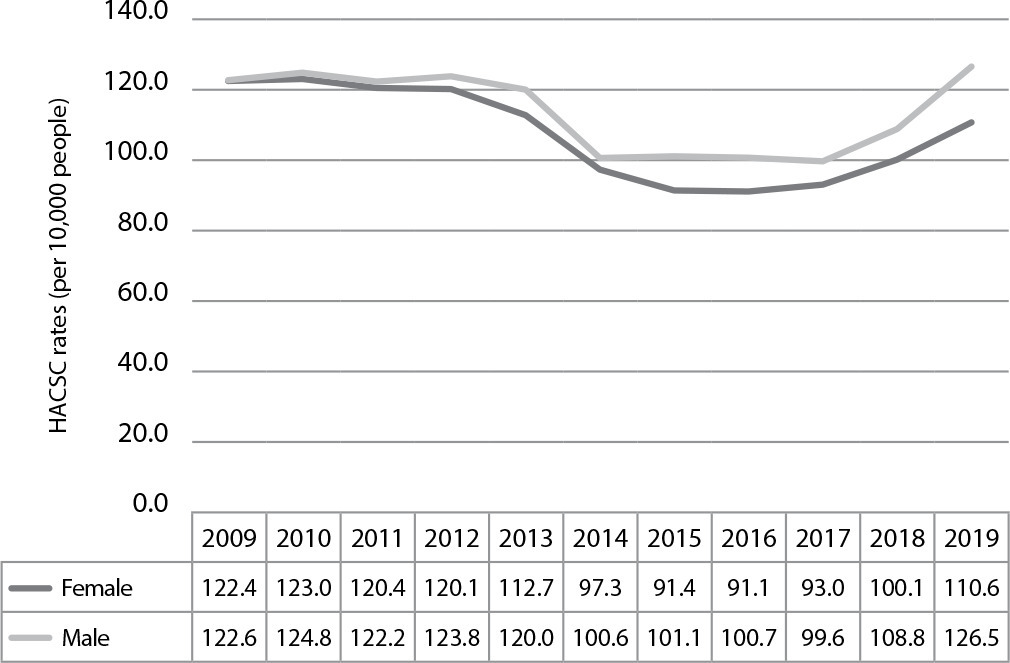
-
ORIGINAL ARTICLE03-17-2023
Characteristics of work in primary care identified in the collective exercise of application of the SWOT matrix
Revista Brasileira de Enfermagem. 2023;76(2):e20220443
Abstract
ORIGINAL ARTICLECharacteristics of work in primary care identified in the collective exercise of application of the SWOT matrix
Revista Brasileira de Enfermagem. 2023;76(2):e20220443
DOI 10.1590/0034-7167-2022-0443
Views0See moreABSTRACT
Objective:
to understand how variables strengths, weaknesses, opportunities and threats make it possible to characterize work in Primary Health Care, to collectively propose strategies for systematizing this process with Family Health teams.
Methods:
methodological research, with 23 participants in direct relationship with Primary Care, including representatives of segments: care (work), management and social control. In one of the three pedagogical meetings, the SWOT matrix was used as a tool for organizational work planning.
Results:
applying the matrix resulted in the following thematic categories: Teamwork and regulations: key elements for interprofessionality at work; Continuing Health Education: path to autonomy and participatory management (co-management).
Final considerations:
the study promoted the systematization of teams’ work, through the mobilization of sectors and distribution of tasks, involving professionals in the co-management of the process.
-
ORIGINAL ARTICLE03-27-2023
Adaptation and validation of an adult patient classification instrument with emphasis on the family dimension
Revista Brasileira de Enfermagem. 2023;76(2):e20220530
Abstract
ORIGINAL ARTICLEAdaptation and validation of an adult patient classification instrument with emphasis on the family dimension
Revista Brasileira de Enfermagem. 2023;76(2):e20220530
DOI 10.1590/0034-7167-2022-0530
Views1See moreABSTRACT
Objectives:
to adapt and validate an instrument for classifying adult patients that emphasizes the family support network in the demand for nursing care.
Methods:
methodological study, carried out in three phases: adaptation of an instrument considering the reality of adult patients; content validation with seven experts and assessment of measurement properties (construct validity and internal consistency) with 781 hospitalized patients.
Results:
in content validation, the indicators reached the values established for the Content Validity Index (0.85-1.00). In the confirmatory factor analysis, the 11 indicators were distributed in three domains and presented average variance extracted and factor loading greater than 0.5. Composite reliability was greater than 0.7.
Conclusions:
the present study adapted and made available, with evidence of validity and reliability, an instrument for classifying adult patients that considers the family support network in the demand for nursing care.

-
ORIGINAL ARTICLE05-08-2023
Interactive gerontechnology for fall prevention in the elderly: a descriptive study
Revista Brasileira de Enfermagem. 2023;76(2):e20220739
Abstract
ORIGINAL ARTICLEInteractive gerontechnology for fall prevention in the elderly: a descriptive study
Revista Brasileira de Enfermagem. 2023;76(2):e20220739
DOI 10.1590/0034-7167-2022-0739
Views0See moreABSTRACT
Objectives:
to develop interactive gerontechnology for the prevention of falls in the elderly at home.
Methods:
an exploratory and descriptive study that consisted of gerontechnology development and evaluation by experts and the target audience. For evaluation, researchers used the Agreement Index (AI), considering values greater than 80%.
Results:
the three-dimensional virtual scale model was elaborated through the SketchUp program, with the distribution of rooms and floors, constituting Prototype 1 (P1). Fifty-four judges evaluated the P1, and all presented agreement above the established, with a minimum AI of 88% and a maximum of 100%, producing Prototype 2 (P2). Thirty elderly participants from a philanthropic institution evaluated Prototype 2. On all items, AI ranged from 83% a 100%, resulting in the final version.
Conclusions:
the product of this research reveals itself as an innovative and scientifically based tool aimed at preventing falls in the elderly.
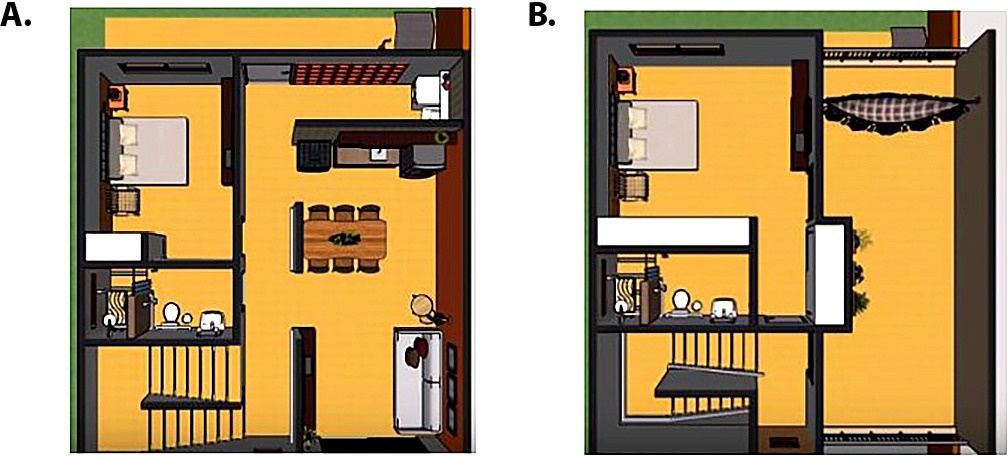
-
ORIGINAL ARTICLE08-21-2023
Effectiveness of educational intervention among seropositive women about knowledge about HIV sexual transmission
Revista Brasileira de Enfermagem. 2023;76(3):e20220371
Abstract
ORIGINAL ARTICLEEffectiveness of educational intervention among seropositive women about knowledge about HIV sexual transmission
Revista Brasileira de Enfermagem. 2023;76(3):e20220371
DOI 10.1590/0034-7167-2022-0371
Views0See moreABSTRACT
Objectives:
to assess the effectiveness of a group and telephone educational intervention with seropositive women about knowledge about HIV sexual transmission prevention.
Methods:
a quasi-experimental before-and-after study, carried out with 151 women living with HIV in a Specialized Care Service in a Brazilian capital. The educational intervention was carried out in three moments, with the assessment being carried out before the first and after the last moment.
Results:
97.4% of study participants were cisgender women aged between 18 and 58 years; 55.6% considered themselves brown; and 32.5% of interviewees had elementary school. Regarding knowledge about HIV sexual transmission, in 78.5% of items, there was an association (p<0.005) with increased participants’ knowledge after receiving the intervention.
Conclusions:
the educational intervention helped to increase the knowledge of women living with HIV about the sexual transmission of the infection.

-
ORIGINAL ARTICLE09-09-2022
Primary care nurses’ learning styles in the light of David Kolb
Revista Brasileira de Enfermagem. 2022;75(6):e20210986
Abstract
ORIGINAL ARTICLEPrimary care nurses’ learning styles in the light of David Kolb
Revista Brasileira de Enfermagem. 2022;75(6):e20210986
DOI 10.1590/0034-7167-2021-0986
Views0See moreABSTRACT
Objectives:
to identify primary care nurses’ learning styles in the light of David Kolb’s Experiential Learning Theory.
Methods:
a descriptive and exploratory qualitative study. A semi-structured interview script was used for data collection and content analysis for data processing.
Results:
primary care nurses showed different learning styles: diverging, which combines active experimentation and reflective observation; assimilating, which combines reflective observation and abstract conceptualization; converging, which associates abstract conceptualization and concrete experience; and accommodating, which unites concrete experience and active experimentation.
Final Considerations:
learning through experience requires that knowledge be understood and transformed. Nurses learn in different ways, as they have different learning styles. Therefore, recognizing nurses’ learning styles is important to foster ongoing professional development and ensure safe nursing care.
-
ORIGINAL ARTICLE11-26-2022
Mental health assistance in Primary Care: the perspective of professionals from the Family Health Strategy
Revista Brasileira de Enfermagem. 2022;75:e20190326
Abstract
ORIGINAL ARTICLEMental health assistance in Primary Care: the perspective of professionals from the Family Health Strategy
Revista Brasileira de Enfermagem. 2022;75:e20190326
DOI 10.1590/0034-7167-2019-0326
Views0See moreABSTRACT
Objective:
To learn about the perceptions of the professionals who work in Primary Health Care about mental health care.
Methods:
Descriptive and qualitative study, carried out with 29 health workers through open and individual interviews. The IRaMuTeQ® software was used to organize the data which, then, was submitted to a content analysis process in the thematic modality.
Results:
Three classes emerged from the content analysis: “Perceptions about the mental health care provided in the city”, “The biomedical paradigm in mental healthcare”, and “Elements for the construction of a new way for professionals to act in mental health”.
Final considerations:
It was found that, despite the good infrastructure of the services and the elements pointed at by the professionals to create a new way to act, they do not do so, and the responsibility falls, mostly, on the psychologist to carry out these activities.
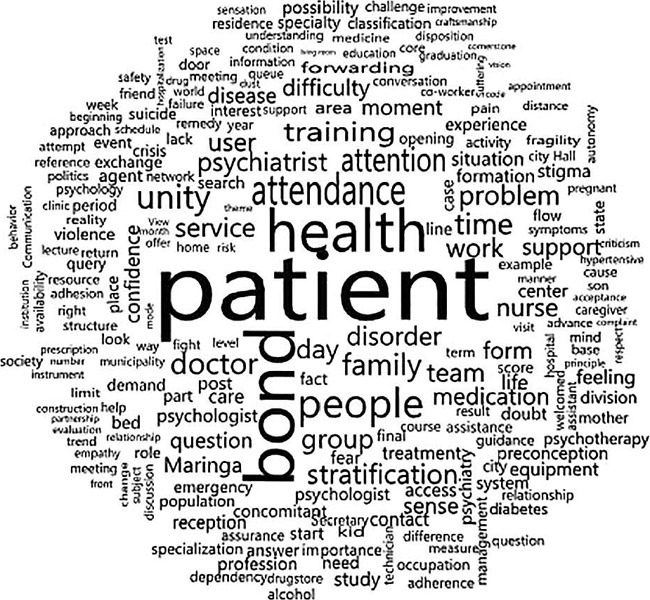
-
ORIGINAL ARTICLE10-25-2022
COVID-19 pandemic and nursing week: analysis from software Iramuteq
Revista Brasileira de Enfermagem. 2022;75:e20200690
Abstract
ORIGINAL ARTICLECOVID-19 pandemic and nursing week: analysis from software Iramuteq
Revista Brasileira de Enfermagem. 2022;75:e20200690
DOI 10.1590/0034-7167-2020-0690
Views0See moreABSTRACT
Objective:
to analyze the themes of publications on the Federal Council of Nursing (Cofen) website during Nursing Week 2020.
Method:
documentary, qualitative research, whose data sources were publications on the Cofen website from May 12 to 20, 2020. Data were processed by software IRAMUTEQ®, through the Descending Hierarchical Classification and analyzed under the historical materialism framework.
Results:
thirty publications were analyzed, giving rise to five classes.
Final considerations:
the themes published in the period investigated pointed to the grief experienced by the category, due to the death of its members, and the fight for better working conditions. Overcoming the pandemic involves recognizing science and the Unified Health System, protecting nursing workers’ health and fighting misinformation and fake news.
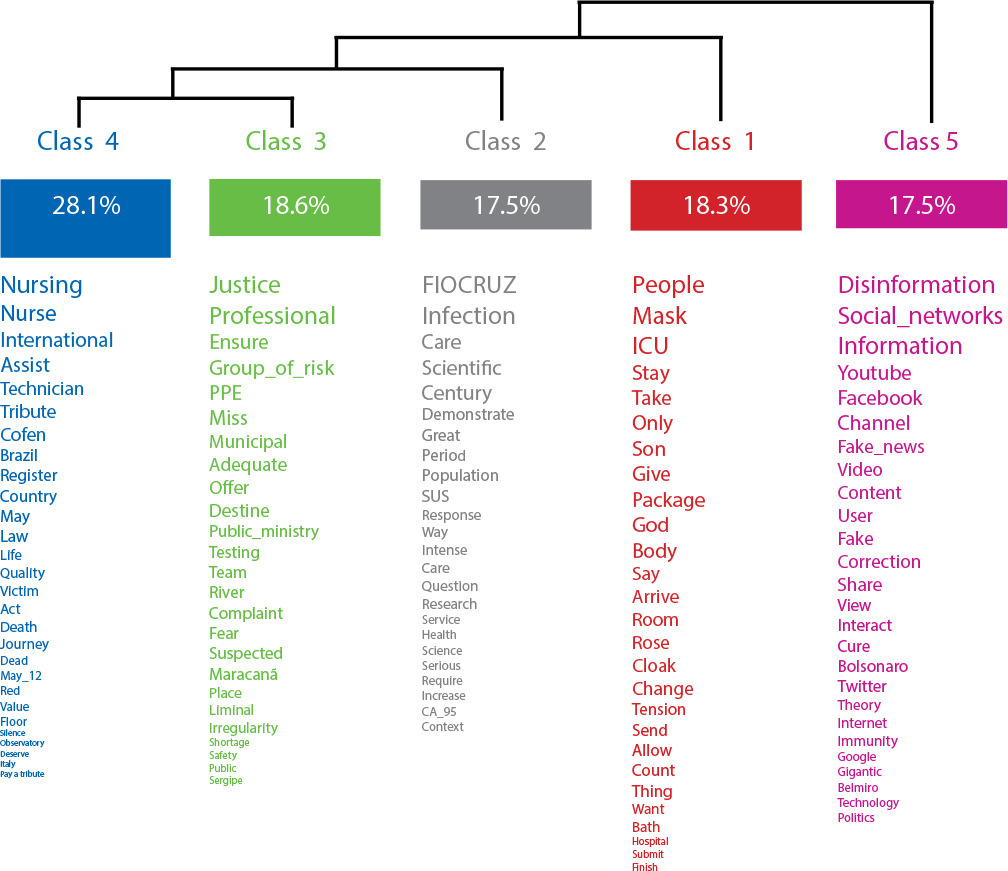
-
REFLECTION09-29-2022
Hemodialysis in the context of COVID-19: care, nursing protagonism and quality
Revista Brasileira de Enfermagem. 2022;75:e20201077
Abstract
REFLECTIONHemodialysis in the context of COVID-19: care, nursing protagonism and quality
Revista Brasileira de Enfermagem. 2022;75:e20201077
DOI 10.1590/0034-7167-2020-1077
Views0See moreABSTRACT
Objective:
To reflect on the need to reorganize satellite dialysis units to ensure the safety of patients and workers, focusing on minimizing the risk of contamination by SARS-CoV-2.
Methods:
Reflection considering the guidelines of international and Brazilian institutions and scientific articles, with a view to possible adaptations to the Brazilian reality.
Results:
The actions suggested and adapted by Dialysis Units from different countries during the pandemic focus on the quality of care and safety of the patient and workers. There was an opportunity to reflect on these actions using the Donabedian Model for quality of care and highlight the nursing team’s role in this context.
Final considerations:
The focus on quality and safety related to institutionalized processes and the assessment through indicators can contribute to the management of the outpatient dialysis unit in the context of COVID 19.
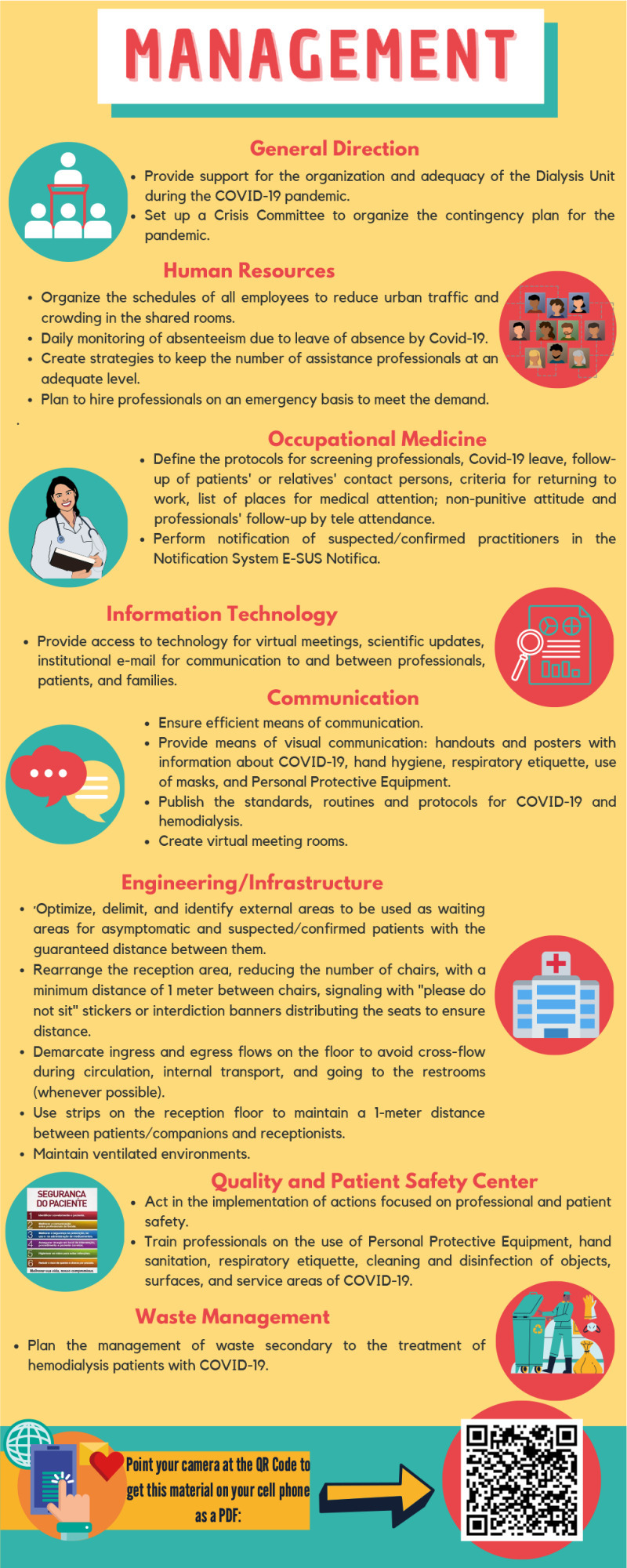
-
ORIGINAL ARTICLE11-29-2022
Reflections on nursing and COVID-19 in light of health education
Revista Brasileira de Enfermagem. 2022;75:e20201305
Abstract
ORIGINAL ARTICLEReflections on nursing and COVID-19 in light of health education
Revista Brasileira de Enfermagem. 2022;75:e20201305
DOI 10.1590/0034-7167-2020-1305
Views0See moreABSTRACT
Objective:
To reflect on the nursing and pandemic of COVID-19 considering health education, health promotion, and the Ottawa Charter action areas.
Methods:
A theoretical-reflexive study on health education and health promotion concepts and the areas of action presented in the Ottawa Charter.
Results:
Educational actions are present in the contexts of epidemics and pandemics, as well as in the work of nurses, who need to be increasingly based on dialogue and individual and collective empowerment to enable users to adopt healthy and preventive behaviors – in this case, concerning COVID19. However, this professional needs effective and efficient public policy actions and measures based on scientific assumptions of health promotion. Final considerations: The actions of health education need to be increasingly valued because knowledge can be considered the first “vaccine” to combat any pandemic.

-
REVIEW10-18-2022
Decision making by health professionals during COVID-19: an integrative review
Revista Brasileira de Enfermagem. 2022;75:e20210067
Abstract
REVIEWDecision making by health professionals during COVID-19: an integrative review
Revista Brasileira de Enfermagem. 2022;75:e20210067
DOI 10.1590/0034-7167-2021-0067
Views1See moreABSTRACT
Objective:
To analyze the scientific production on the decision making of health workers during the COVID-19 pandemic.
Methods:
Integrative review in the databases CINAHL, MEDLINE, Scopus, ScienceDirect, WoS, and BVS. Inclusion criteria: original articles available in full, in any language, related to the object investigated.
Results:
During this pandemic, health workers have been making decisions based on ethical/bioethical principles (utility, beneficence, non-maleficence, autonomy, justice, proportionality, flexibility, clinical prognosis, duration of the need, and fair health attention), values (solidarity, equality, equity, utilitarianism, relational autonomy, reliability, reciprocity, maximization of the benefits and resources, and prioritization of those in worse conditions), beliefs and personal motivation, protocols, directives, tools, algorithms, recommendations, and criteria.
Final considerations:
Decision making has never been so necessary as in this pandemic. This article is not a recipe for the professionals, since decision making is based on numerous factors. However, it provides them with a foundation that can be helpful in this difficult process.

-
REVIEW08-26-2022
Health literacy of adolescents in the COVID-19 pandemic: an integrative review
Revista Brasileira de Enfermagem. 2022;75:e20210956
Abstract
REVIEWHealth literacy of adolescents in the COVID-19 pandemic: an integrative review
Revista Brasileira de Enfermagem. 2022;75:e20210956
DOI 10.1590/0034-7167-2021-0956
Views0See moreABSTRACT
Objective:
to analyze the scientific production on health literacy (HL) of adolescents during the COVID-19 pandemic.
Method:
an integrative review, in the MEDLINE, LILACS, CINAHL and Web of Science databases, between March 2020 and August 2021. Original articles in English, Spanish and Portuguese were included.
Results:
of the 65 studies found in the search, eight were included for analysis, with no publication in Brazil, with five publications in 2021, predominantly in English (n=7) and all classified with level of evidence VI. Of the instruments used, eHealth literacy was the most applied instrument (n=2). Television, family and the internet were identified as the main sources of health information during the pandemic.
Final considerations:
the literature has indicated that HL can interfere with adolescents’ decision making and that a low HL can lead to decisions and physical and mental exposure actions of adolescents.
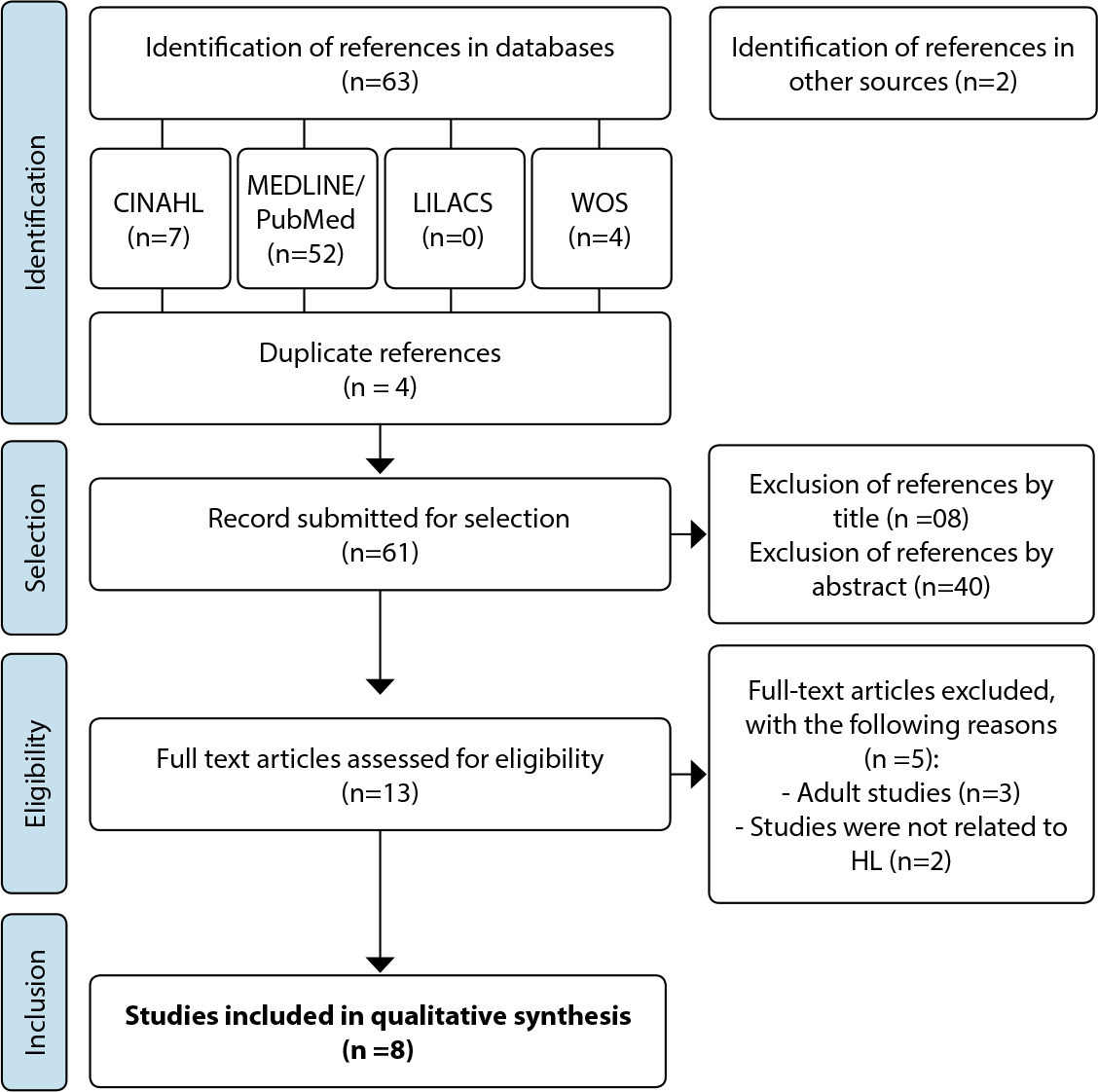
-
ORIGINAL ARTICLE01-14-2022
Hospital structure elements demarcating (in)visibilities of institutional violence against children
Revista Brasileira de Enfermagem. 2022;75:e20200785
Abstract
ORIGINAL ARTICLEHospital structure elements demarcating (in)visibilities of institutional violence against children
Revista Brasileira de Enfermagem. 2022;75:e20200785
DOI 10.1590/0034-7167-2020-0785
Views0See moreABSTRACT
Objectives:
to analyze the hospital structure elements that demarcate (in)visibilities of institutional violence in hospitalized children.
Methods:
this is a descriptive-exploratory qualitative study that used approaches with Foucault’s thinking. Ten companions and 39 healthcare professionals from a university hospital in Salvador, Bahia participated. Data collection took place from November 2018 to June 2019 through semi-structured interviews. The discourse analysis method was used. The study was approved by the Institutional Review Board.
Results:
institutional violence was understood in the violations and invisibilities of the structure of health services through the problems: in infrastructure (physical structure, lack of human and material resources, scrapping of equipment); administrative and management; pilgrimage.
Final Considerations:
it is necessary to realize the invisibilities of the infrastructure to act in confronting institutional violence to hospitalized children.
Search
Search in:
Nuvem de Tags
Adolescente (85) Atenção Primária à Saúde (239) COVID-19 (91) Criança (91) Cuidados de Enfermagem (269) Educação em Enfermagem (151) Educação em Saúde (139) Enfermagem (930) Enfermagem Pediátrica (86) Estudantes de Enfermagem (77) Estudos de Validação (131) Família (87) Idoso (208) Promoção da Saúde (99) Qualidade de Vida (104) Saúde do Trabalhador (86) Saúde Mental (145) Saúde Pública (82) Segurança do Paciente (150) Tecnologia Educacional (100)



